Arrow’s Season 3 finally has some new life breathed into it. These past two episodes have been a confident, cohesive return-to-form for the superhero show, which struggled after a strong start to the season. No, it wasn’t Oliver’s almost-death and brief absence from Starling City that brought this show back to life. (Though somewhat successful, that storyline could have been handled much, much better.) For me, it was the moment when Oliver told Thea his secret that Arrow finally took flight again. (Arrow pun!)

The return of relatability
I have recently started re-watching Arrow Season 1 with a friend. She had never seen it, but has watched some random Season 3 eps. Her opinion? Season 1 is far superior. Now, this probably has something to do with the fact that watching serialized television out of context means missing many of the story’s nuances and caring about the characters way less, but I think her perspective also has something to do with the way Season 1 grounds its superhero action with consistent, relatable characterization. In recent episodes, this relatability has been somewhat lost from Arrow. It is partially in the ways characters react to things (i.e. Diggle and Roy greeting Oliver in his return FROM THE DEAD with a friendly handshake)…
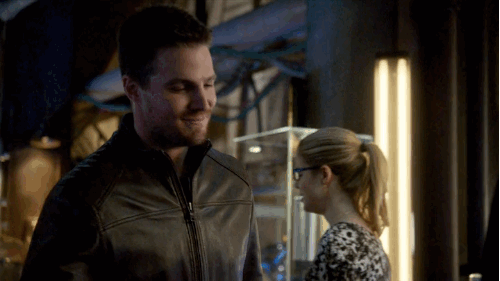
 (This is NOT how you welcome someone back from the dead.)
(This is NOT how you welcome someone back from the dead.)
…but it also comes in the inconsistency of characterization. A lot of this season’s character motivation has felt lazy. Characters have taken stances not because it makes sense for who they are, but because the show needs an opposing views to manufacture conflict. This has hit Roy and Diggle’s characters especially hard. For example, Roy arguing that Malcolm Merlyn isn’t all that bad because he saved Thea in the Undertaking…

…But when character motivation is inconsistent, it hurts the entire show. It affects the validity of every character. Arrow‘s relatability has also been missing in the show’s stripping away of all things domestic. Arrow has never been a show that dabbles in the mundane (and I love it for that), but we used to see these characters occasionally eating dinner or going to work. They had conversations about things other than their arch nemeses and crime-fighting. (The Flash hasn’t lost this connection to reality yet, even if Jitters is a weird coffee shop.) Arrow has reclaimed some of this domesticity in recent episodes with the relationship between Thea and Oliver.
Family is something we non-superhero folk can relate to. (Another rule that The Flash remembers and puts to good use, using Barry’s relationship with Joe especially to ground the metahuman-ness of it all.) Thea and Ollie’s sibling relationship has always been one of the most enjoyable and relatable aspects of this show. Now that they’re relationship is no longer bogged down by the secrets Oliver was keeping from Thea, it has so much narrative potential again.
The return of a likable Oliver
The return of a strong Thea/Oliver sibling dynamic also gives us something to like about Oliver. And the best thing about this past episode? How likeable Oliver was in it. As of late, Oliver has had a bit of a likeability problem — at least for me. (He’s kind of like television family: I always love him, but I don’t always like him.) He has a tendency to order everyone around, make decisions for the people (especially the women) in his life, and act as if he is the only one with the right or skills to save the city.

These traits aren’t new developments. Oliver’s intense protective streak has often manifests by making decisions for his loved ones, putting their safety above their right to make their own decisions. I kind of appreciate that Arrow gives Oliver this dude-ly persona because it’s totally believable and necessary to deconstruct. I may not know any superheroes, but I do know guys who make unitlateral decisions for the group and expect everyone to go along with it. It’s a side effect of our culture’s messed up idea of masculinity and rigid gender roles and, as demonstrated by Oliver, it doesn’t just hurt the dude’s loved ones. It also hurts the dude. I am willing to wait out any especially dude-ly spells Arrow puts me through the faith that this show has at least some self-awareness of it (though not as much awareness as I would like). This has not been the case for much of Season 3, but — recently — characters have started calling Oliver out on his behavior more. And, more importantly, the show has been backing them up. Because it doesn’t matter how many people yell at Oliver if Arrow still treats his character solely as the tortured hero who deserves only our sympathy and glorification.

I’ve said before that Arrow is at its best when it is addressing Oliver’s serious mental health issues — the trauma he is still not and will probably never be over, and how the coping mechanism he used to stay alive are now keeping him from living. Seeing these characters call Oliver out with the show’s backing does this. Starting with Felicity’s heartbreaking, but dramatically wonderful “I don’t want to be a woman you love” speech, this show seems to be getting back on its feet when it comes to this more complex characterization of Oliver.




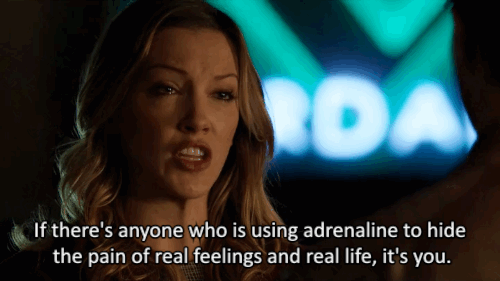
And the truly miraculous part? Oliver actually seems TO BE LISTENING. I have to admit: I was beginning to worry that Arrow didn’t see how unlikeable this white, rich(ish) male character could become if not carefully monitored. We live in a television universe and culture that is thankfully (if not slowly) becoming more critical of the ubiquitous white dude narrative — yes, even the superhero variety.

Some of the best superhero narratives in a culture currently flooded with superhero narratives are the ones that critique the privileged persona in some way. They take themselves seriously, but have the insight and self-awareness to realize that viewers only have so much sympathy for characters for represent the most powerful identity in our society made more powerful by his superhero-ness. Sure, we have sympathy for Oliver on a personal level — Oliver Queen has been through a lot of crap — but that doesn’t mean we (or, at least, I) are going to give him a free pass when it comes to privilege. Arrow is my favorite when it calls Oliver out on his myopic willfulness so often born of social privilege, while still treating him as a character who deserves our compassion. However, this only works if Oliver is receptive to the views of others. Otherwise, he’s just kind of a dick.




The return of Slade Wilson
Oh, Slade, how I have missed you and your ability to draw out the word “mirakuru.” (Sadly, there was no mention of the super serum in this episode.) Slade’s return may have been a reminder that Arrow has been missing a villain as charismatic and personal (to Oliver) in the third season, but it didn’t matter. I was still glad to have him back — and glad to see that he hasn’t forgotten his vow of vengeance against Oliver. Just hearing him gravel “I keep my promises, kid” at Oliver was enough to send shivers down my spine. It also led to one of the best Olicity moments and overall scenes of the season so far — and Felicity wasn’t even in it!



Arrow doesn’t always try to go subtle with a scene so, when it does and it pulls it off, it’s magic. Slade knows just how to get under Oliver’s skin — and that’s always what has made Slade such a good villain. Because he and Oliver were friends before they were enemies. Slade knows Oliver better (or at least differently) than many of the people in Oliver’s life not only because he was with him on The Island, but he was with him on The Island before Oliver learned how to start building walls. Heck, Slade was the reason for so many of those walls. Slade got to Oliver’s heart and mind in a way that seems impossible for any villain to do so now. Oliver won’t even let his friends and family past his emotional defenses. He’s reverting to an early Season 1 version of himself, an Oliver unable or unwilling to be Oliver Queen. Because being the Arrow is easier. Because being Oliver Queen hurts.

(Slade outlines the theme of the season because he does what he wants.)
The return of flashbacks we can care about
The flashback structure has been an uneven storytelling tool for Arrow. When it works, it gives the show — and specifically Oliver’s character — incredible depth and emotional resonance. When it doesn’t work, it stalls the momentum from everything happening in the present-day storyline and does damage to Oliver’s characterization in subtle ways. Though it’s vague and not always consistent, there seems to be some connection between Oliver’s thought process in the current day and the flashbacks we see — i.e. to a certain extent, the flashbacks are what present-day Oliver is thinking. This means that, when the flashbacks suck, Oliver’s character takes a hit. When the flashbacks bore or confuse us or just don’t have a lot of emotional resonance, then we project those reactions onto Oliver’s present-day character. This is a problem because Arrow has been struggling with its flashbacks in Season 3. There have been some hints of brilliance. (For example, Episode 7 when Oliver and Tatsu bond over being outsiders, then Tatus unleashes her crazy fighting skills for the first time. Also, when we find out Ollie doesn’t know how to do laundry.) For me, “The Return” was the most engaging use of The Flashback I have seen in Season 3. This episode had an emotional economy that has been missing on such a consistent level. Every scene served a thematic and/or emotional purpose beyond moving the narrative along. Unlike in previous weeks, there wasn’t one moment that felt dull or lifeless. I didn’t want this episode to end, and much of that had to do with the excellence of the flashbacks. Checking in with characters we have since lost was cool, but seeing how far Lance and Laurel and Thea have changed — for better or worse — was even cooler. These flashbacks reminded us why we like all of these characters and, more importantly, why we want to watch them because the tension they created was interesting, while still feeling organic.


But it was Oliver who was the true winner of the flashbacks because we got to see the moment when he truly started his path to vigilantism and, for want of a better phrase, becoming a hero. If poor flashbacks damage Oliver’s character in subtle yet devastating ways, then great flashbacks have the opposite effect: they add layer and nuance to his characterization. Seeing Oliver confront the effect his life and presumed death has had on his friends and family was moving. If this is what present-day Oliver is thinking about — how much he has screwed up everyone’s lives — then it gives us some much-needed insight into Oliver’s recent decision-making process and into his overall story arc for the season: eschewing Oliver Queen in favor of becoming The Arrow. This is the first time Oliver is forced to choose between Oliver Queen and The Arrow, and it is so tragic because that lesson Oliver learned long ago — that his loved ones need Arrow more than they need Oliver Queen — it’s flawed. And he can’t see it because, in that specific circumstance when Amanda Waller was threatening to kill anyone he made contact with, maybe he did need to become Arrow. But that is a simplistic, highly-contextualized lesson to apply to his life now. Oliver Queen may be clever in many ways, but he can also be kind of an idiot and that’s why he’s so damn lovable.
Other thoughts
- If the flashbacks are directly tied to what Oliver is thinking about in present-day, does this mean he remembers seeing Felicity for the first time? #feels
- If I had more time or energy, I would write an entire thesis on the evolution of Thea’s character on this show. Man, the way this show has been treating her was really starting to get on my nerves, but she owned this episode. I’ve spoken before about Arrow‘s ability to course-correct what isn’t working. I’m not sure if that’s what happened here — if they realized that Thea’s characterization and story arc really weren’t working or if they had this shift planned all along. Whatever the reason, I’m so glad it happened. I can’t wait to see Thea having some real conversations with the other members of Team Arrow — especially Felicity.
- Random thought? Once Arrow reaches Season 6 (because it better), will Arrow start flashing forward rather than backwards a la Lost? That could be pretty cool, if done right.
- In rewatching Arrow Season 1, I am realizing how much I miss the social justice angle Arrow opened with. Why isn’t Oliver trying to ruin the corporate oligarchy anymore? As much as local crime needs fighting, watching Oliver address the city’s inequalities is much more compelling both within the narrative and as a comment on our current social realities in the real world. Not to mention that addressing economic disparity would probably alleviate some of the conditions that foster crime. Make it happen, Arrow!
- I believe Arrow is set to go on hiatus following tomorrow’s episode. I can’t handle it!
- Felicity may not have had much screen time this episode, but she was definitely present in much of the emotional subtext. I’ll leave you with this excellent Tumblr gif set to illustrate.
EPISODE FEELS RATING: <3 <3 <3 <3 (4 out of 5 hearts)






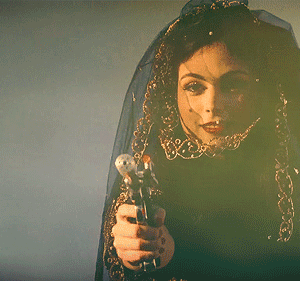
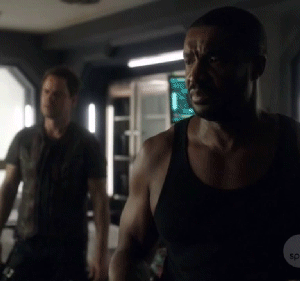
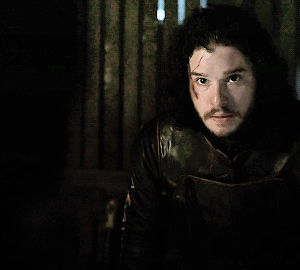
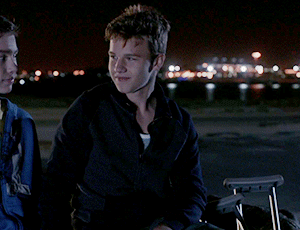
Leave a Reply